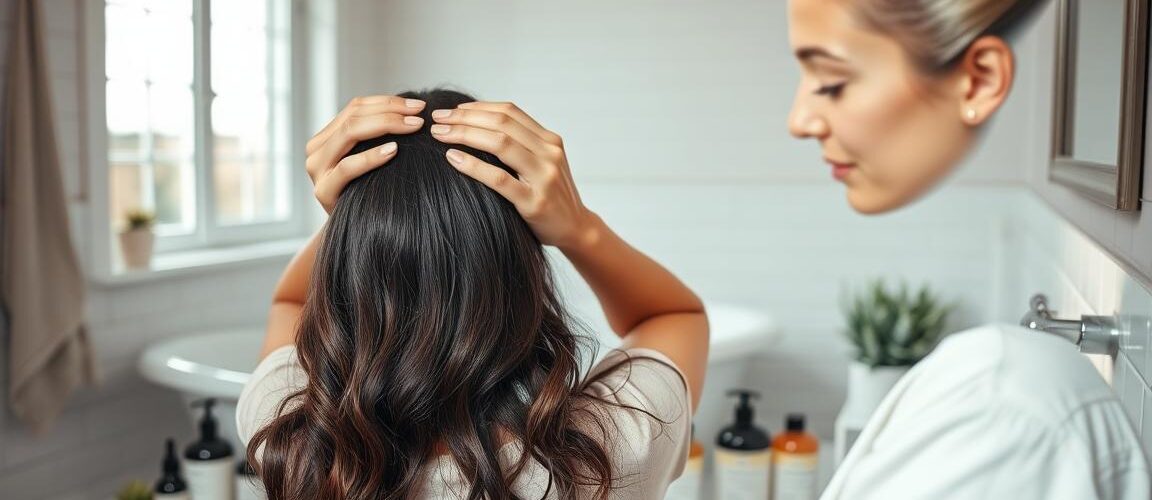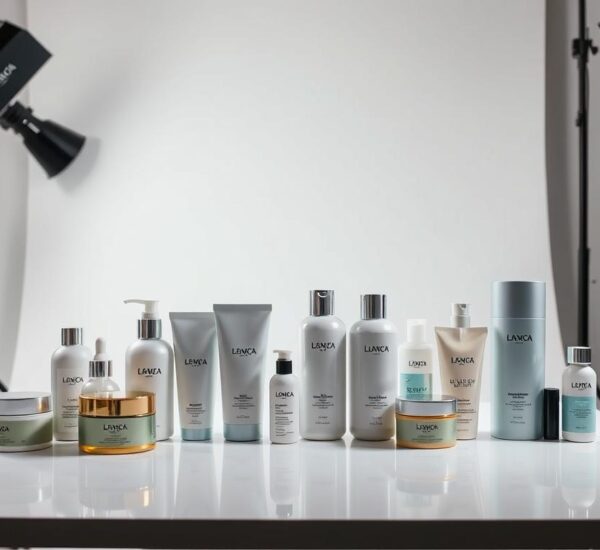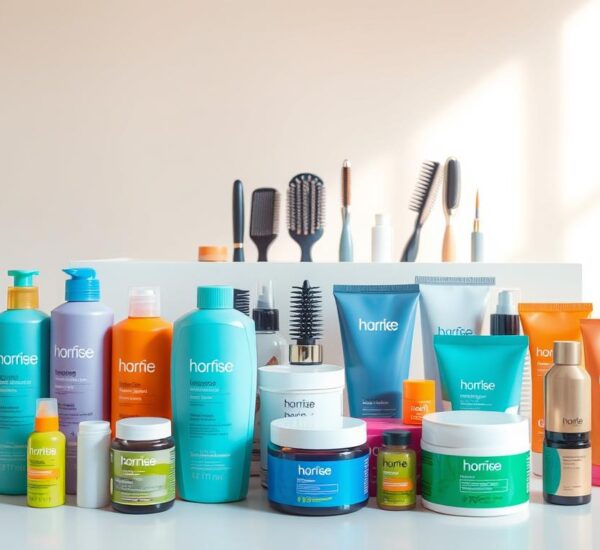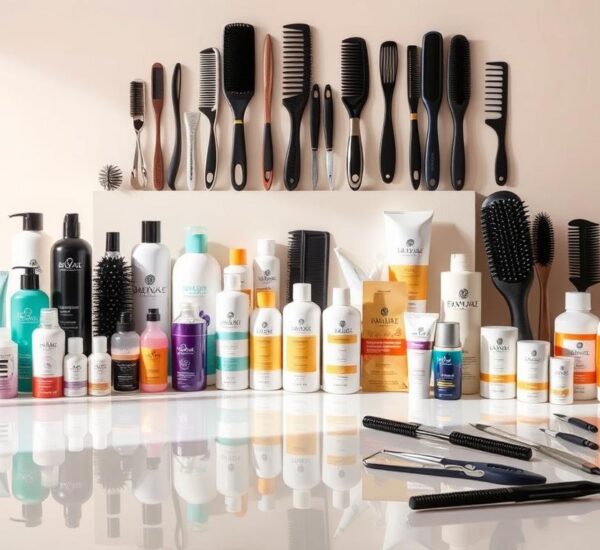Many people want healthy and radiant hair. It needs good hair care habits, a healthy diet, and the right products. With so many options, finding the best for your hair can be hard.
We aim to show you the top haircare routines and DIY remedies for beautiful hair. By using these simple and effective natural tips, you can make your hair healthier and look better.
Key Takeaways
- Understand your hair type to choose the right products.
- Use gentle, sulfate-free shampoo for healthier hair.
- Incorporate a balanced diet rich in vitamins and minerals.
- Protect your hair from heat damage with the right tools.
- Try DIY hair masks for an extra nourishment boost.
Understanding Our Hair Type
Starting a journey to healthy, vibrant hair means first knowing our hair type. Our hair type is key to finding the best haircare routine. By figuring out our hair type, we can pick the organic haircare products and natural haircare techniques that suit us best.
Identifying Different Hair Types
Hair types vary a lot, from straight to curly, and fine to thick. Knowing these categories helps us choose the right products and methods. For example, curly hair needs more moisture than straight hair. Fine hair, on the other hand, does better with lighter products to avoid feeling heavy.
Importance of Knowing Our Hair Type
Knowing our hair type is key because it helps us pick the right haircare products and methods. Using the wrong ones can cause problems like dryness, frizz, or even hair loss. By understanding our hair type, we can tailor our haircare to enhance our hair’s natural beauty using natural haircare techniques.
In short, knowing our hair type is the first step to a good haircare routine. It helps us make smart choices about products and methods, leading to healthier, more vibrant hair.
The Benefits of Natural Haircare
Switching to natural haircare offers many benefits. It can greatly improve the health and look of our hair.
Healthier Hair Growth
Natural haircare helps our hair grow stronger. It uses ingredients that nourish and protect our locks. Unlike harsh chemicals, natural products work well with our hair’s natural chemistry.
Some key natural ingredients for hair growth include:
- Coconut oil, which moisturizes and conditions the hair
- Rosemary essential oil, known for its ability to stimulate hair growth
- Biota, a plant rich in antioxidants that help protect the hair follicles
Environmentally Friendly Choices
Choosing natural haircare is good for our hair and the planet. Commercial products often contain harsh chemicals that pollute waterways. Natural products, on the other hand, are made with biodegradable ingredients that are kinder to the environment.
By choosing natural haircare, we support a greener beauty approach. This helps reduce our impact on the environment.
Cost-Effective Solutions
Natural haircare can also save money. Many ingredients are found in our kitchens or are cheaper than commercial products. For example, coconut oil or a hair mask made from honey and avocado can be very effective.
Natural products often have multiple uses. This means we need fewer products, saving us money in the long run.
Essential Natural Ingredients for Haircare
Nature gives us many ingredients that can change our haircare for the better. These ingredients help us care for our hair in a holistic way, keeping it healthy.
Coconut oil, aloe vera, and honey are top choices for their amazing benefits. They can make our hair look and feel great.
Coconut Oil: A Versatile Moisturizer
Coconut oil is great for dry, damaged hair because it moisturizes well. It goes deep into the hair shaft, making it stronger.
To use coconut oil, put a lot on the ends of your hair and work it up to the roots. Leave it on for at least an hour before washing. For an extra boost, leave it on all night and wash it out in the morning.
Aloe Vera: Nature’s Soothing Gel
Aloe vera is known for soothing the scalp and helping hair grow. It also keeps moisture in, making hair less frizzy and shinier.
To add aloe vera to your routine, apply the gel to your scalp or mix it with a hair mask. You can also use aloe vera juice as a final rinse to add shine and reduce frizz.
Honey: A Natural Humectant
Honey pulls in and keeps moisture, which is good for dry hair. It also fights bacteria, soothing scalp irritations.
To use honey, mix it with shampoo or conditioner, or apply it as a mask. Leave the mask on for 15-30 minutes before rinsing well.
Using these natural ingredients in our haircare can lead to effective haircare strategies. This way, we can have healthy, shiny hair.
| Ingredient | Benefits | Usage |
|---|---|---|
| Coconut Oil | Moisturizes, reduces protein loss, promotes hair strength | Apply to hair, leave on for at least an hour or overnight |
| Aloe Vera | Soothes scalp irritations, locks in moisture, reduces frizz | Apply gel to scalp or mix with hair mask, use juice as final rinse |
| Honey | Attracts and retains moisture, soothes scalp irritations | Mix with shampoo or conditioner, apply as hair mask |
Creating a Customized Haircare Routine
Creating a haircare routine that fits you is key to having healthy, shiny hair. Knowing what your hair needs and making a plan just for you helps tackle hair problems and reach your hair goals.
Assessing Our Hair Needs
The first step is to figure out what your hair needs. This means knowing if your hair is dry, oily, or a mix of both. It also means spotting any hair issues like dandruff, frizz, or damage.
To understand your hair needs, watch how it reacts to different conditions. For example, how does it handle humidity or dry air? Does it get oily fast or stay dry even with moisturizers?
Setting Realistic Goals
After knowing your hair needs, set achievable hair goals. Maybe you want softer, shinier hair or less frizz and easier manageability. Having clear goals helps tailor your routine.
Be realistic with your hair goals. For curly hair, aiming for straight hair every day might not be realistic. Instead, focus on improving your natural curl and reducing frizz.
Frequency of Hairwashing
How often you wash your hair is also important. Washing too much can dry out your hair, while washing too little can make it oily. Finding the right balance is key.
The best hairwashing frequency depends on your hair type and lifestyle. If you have oily hair, you might need to wash it more. Dry or curly hair might need less washing.
By understanding your hair needs, setting realistic goals, and finding the right washing frequency, you can make a customized haircare routine. This tailored approach helps you achieve your hair goals and keeps your scalp healthy. It makes you feel more confident and vibrant.
By following these natural haircare tips and adopting a healthy haircare routine, you can enjoy gorgeous, radiant hair. Your hair will look and feel its best.
Natural Hairwashing Techniques
Natural hairwashing is more than just a routine; it’s a journey towards healthier, more radiant hair. By adopting the right techniques, we can significantly improve the health and appearance of our locks.
Choosing the Right Shampoo
The first step in natural hairwashing is selecting a shampoo that aligns with our hair type and needs. Organic haircare products are often a good choice because they are free from harsh chemicals that can strip our hair of its natural oils.
When shopping for a shampoo, we should look for ingredients that nourish and moisturize our hair. Ingredients like coconut oil, shea butter, and argan oil are known for their beneficial properties.
How to Create a Gentle Cleanse
Creating a gentle cleanse involves understanding our hair’s unique needs and using the right techniques. We can start by using lukewarm water instead of hot water, which can strip our hair of its natural oils.
Massaging our scalp gently during washing can also help remove dirt and buildup without causing damage. Incorporating DIY haircare remedies, such as a pre-wash treatment with apple cider vinegar or a honey mask, can add an extra layer of nourishment.
Rinsing Tips for Maximum Shine
Rinsing is a key step in the hairwashing process. To achieve maximum shine, we should rinse our hair with cold water to seal the cuticles.
Using a microfiber towel or an old t-shirt to dry our hair instead of a regular towel can reduce friction and prevent breakage. This leads to shinier, healthier-looking hair.
By implementing these natural hairwashing techniques, we can enjoy healthier, more radiant hair that looks and feels its best.
Conditioning Naturally
Exploring natural haircare shows us how important conditioning is. It keeps our hair healthy and strong. Using natural ingredients and methods in our conditioning routine can make our hair look better.
The Role of Conditioners in Hair Health
Conditioners are key for hair health. They moisturize, nourish, and protect our hair. Natural conditioners make hair easier to manage, reduce breakage, and improve texture. Choosing conditioners without harsh chemicals keeps our hair balanced.
DIY Conditioner Recipes to Try
Making your own conditioner with natural ingredients is fun and good for your hair. Here are a few easy recipes to try:
- Coconut Oil Conditioner: Mix coconut oil with shea butter and essential oils for a nourishing conditioner.
- Aloe Vera Conditioner: Blend aloe vera gel with olive oil and honey for a soothing and moisturizing conditioner.
Deep Conditioning: Why It Matters
Deep conditioning involves applying conditioner and leaving it on for a long time. It fixes damaged hair, improves elasticity, and adds shine. For vegan haircare, use a deep conditioning treatment weekly with avocado, banana, or argan oil.
Understanding conditioners, trying DIY recipes, and deep conditioning can greatly improve hair health and look. Embracing natural haircare techniques leads to stronger and more beautiful hair.
The Power of Herbal Rinses
Adding herbal rinses to our haircare routine can change the game. They help make our hair healthier and more vibrant. Herbal rinses are a natural way to boost hair growth, shine, and overall hair health.
Best Herbs for Hair Growth
Some herbs are great for growing hair and making hair follicles stronger. Here are the top ones:
- Rosemary: It boosts scalp circulation, helping hair grow.
- Sage: It stimulates hair growth and makes hair color better.
- Lavender: It helps hair grow by reducing stress and keeping the scalp healthy.
How to Prepare Herbal Rinses
Making herbal rinses is easy with just a few things. You’ll need:
- 1 cup of water
- 1 tablespoon of dried herbs (or 2 tablespoons of fresh herbs)
Boil the water, add herbs, and steep for 10-15 minutes. Strain it, cool it down, and use it as a final rinse after shampooing.
Using Rinses for Enhanced Shine
Herbal rinses do more than grow hair. They also make our hair shine. The herbs’ antioxidants and nutrients smooth the hair cuticle, making it look healthy and vibrant. Using herbal rinses regularly can greatly improve our hair’s look, making it more radiant and soft.
By using herbal rinses in our holistic haircare practices, we choose a natural and effective haircare strategy. It’s good for our hair and the planet.
Scalp Care Strategies
A healthy scalp is key to beautiful hair. We must understand scalp care’s role in hair health. Here, we’ll look at ways to keep your scalp healthy.
Importance of a Healthy Scalp
A healthy scalp is vital for hair growth and health. It prevents problems like dandruff and itchiness. For more on scalp health, check out this resource on scalp detox.
Natural Treatments for Scalp Issues
Natural treatments are great for scalp problems. Tea tree oil fights fungus, and apple cider vinegar balances pH. These can soothe irritation and improve scalp health.
Massaging Techniques for Blood Flow
Scalp massage boosts blood flow, which aids hair growth. It strengthens follicles and promotes growth. Just use your fingertips in circular motions.
| Benefit | Description |
|---|---|
| Increased Blood Flow | Stimulates hair growth by delivering more oxygen and nutrients |
| Reduced Stress | Helps in relaxing the scalp muscles, reducing tension |
| Improved Scalp Health | Can help in removing dead skin cells and other debris |
By using these scalp care strategies and natural haircare tips, we can greatly improve our hair. This is essential for healthy haircare routines.
Styling with Natural Products
More people are moving towards natural haircare. This includes using gentle and effective styling products. It’s important to style our hair in a way that’s healthy, avoiding harsh chemicals for natural alternatives.
Natural Alternatives to Gels and Mousses
Gels and mousses are common styling tools, but they can harm our hair. Luckily, there are natural options that work just as well. For example, flaxseed gel is a homemade DIY haircare remedy. It’s a great choice for those who want hold without dryness.
Benefits of Embracing Heat-Free Styling
Heat styling tools can damage our hair, leading to breakage and texture changes. Choosing heat-free styling methods is better for our hair. Techniques like twisting, braiding, and air-drying are healthier and stylish.
Protecting Hair During the Styling Process
Protecting our hair is key, no matter the styling method. Using a wide-tooth comb instead of regular combs or brushes helps prevent breakage. Also, applying a leave-in conditioner or natural oils like coconut or argan oil can protect our hair from damage.
| Product | Benefits | Drawbacks |
|---|---|---|
| Flaxseed Gel | Natural hold, moisturizes | Can be time-consuming to make |
| Coconut Oil | Hydrates, protects | Can be greasy if used excessively |
| Aloe Vera Gel | Soothes scalp, adds shine | May not provide strong hold |
| Argan Oil | Protects from heat, adds moisture | Can be expensive |
Using natural styling products and methods can greatly improve our hair’s health and look. Options like DIY haircare remedies and heat-free styling have many benefits. It’s also important to protect our hair during styling, using the right tools and products is key.
The Importance of Hydration
Hydration is key to keeping our hair healthy and full of life. When we drink enough water, our hair becomes strong, shiny, and less prone to damage. Here, we’ll look at how staying hydrated affects our hair and share tips to make it look its best.
Drinking Water and Hair Health
Drinking enough water is vital for hair growth and health. Water makes up a big part of our hair, and not drinking enough can make it dry and break easily. We suggest drinking at least eight glasses of water a day to keep your hair in top shape.

Hair Hydration Tips
There are also ways to hydrate your hair from the outside. Using a hydrating mask once or twice a week can greatly improve moisture levels. Choose products with natural ingredients like coconut oil, shea butter, or argan oil for their moisturizing benefits.
- Use a hydrating shampoo and conditioner that fits your hair type.
- Apply a leave-in conditioner or hair serum to keep moisture in.
- Stay away from hot water, as it can take away your hair’s natural oils.
Incorporating Hydrating Treatments
For even more hydration, add deep conditioning treatments to your routine. Deep conditioning can fix damage and keep moisture in, making your hair soft and healthy. Natural haircare methods like hair steaming can also boost hydration.
| Hydrating Treatment | Benefits | Frequency |
|---|---|---|
| Deep Conditioning | Repairs damage, locks in moisture | Once a week |
| Hair Mask | Provides intense hydration | Once or twice a week |
| Hair Steaming | Enhances moisture absorption | Every two weeks |
By mixing these treatments with a healthy diet and a regular haircare routine, you can get the vibrant, healthy hair you want. Use natural haircare techniques and vegan haircare tips to keep your hair looking great.
Seasonal Haircare Adjustments
Seasonal changes can really affect our hair’s health and look. We need to change our haircare routines as the seasons shift. Understanding these changes helps us keep our hair healthy and vibrant all year.
Winter Challenges for Hair
In winter, our hair gets dry and brittle from the cold and low humidity. To fight this, we should use moisturizing products and treatments. A hydrating mask once or twice a week can really help.
Also, washing our hair less and using a gentle shampoo helps keep its natural oils. This makes our hair healthier and more resilient in winter.
Summer Sun Protection for Our Hair
Our hair needs sun protection just like our skin. The sun’s UV rays can dry out, fade, and break our hair. Using hair products with SPF or wearing a hat outdoors helps protect it.
Using holistic haircare practices like coconut oil or natural oils also nourishes and shields our hair from the sun.
Adapting Our Routine Year-Round
It’s important to adjust our haircare routine with the seasons. This might mean changing our products, how often we wash, or adding different treatments.
By paying attention to our hair’s needs and adjusting our effective haircare strategies, we can keep our hair healthy and beautiful all year. Whether it’s hydrating treatments in winter or protective products in summer, a flexible routine is essential for great hair health.
Nutritional Impact on Hair Health
Getting healthy and beautiful hair is more than just using the right products. It’s also about feeding our body well. What we eat greatly affects our hair’s health and look.
By adding natural haircare tips to our diet, we can help our hair grow strong and stay shiny.
Foods That Promote Strong Hair
Some foods are packed with nutrients good for hair. These include:
- Foods high in omega-3 fatty acids, like salmon and walnuts, which help the scalp.
- Leafy greens, such as spinach, which are full of iron and help hair grow.
- Nuts and seeds, like almonds and sunflower seeds, which are full of vitamins and minerals.
Supplements Worth Considering
Along with a good diet, some supplements can also help hair health. These include:
- Biotin supplements, which strengthen hair follicles.
- Vitamin C supplements, which help with collagen production and improve hair texture.
- Fish oil supplements, which give omega-3 fatty acids.
The Role of a Balanced Diet
A healthy haircare routine begins with a balanced diet. This diet should include foods from all groups. A balanced diet gives our hair the nutrients it needs to grow and stay healthy.
By mixing a balanced diet with healthy haircare routines, we can get strong, healthy, and beautiful hair.
Avoiding Common Haircare Mistakes
Getting healthy, beautiful hair is more than just picking the right products. It’s about avoiding common mistakes. Knowing what to avoid helps protect our hair and make it look its best.
Over-Washing: Why It’s Harmful
Washing our hair too much can dry it out and make it break. It messes with the scalp’s natural balance, leading to irritation. Finding the right washing schedule for our hair type is key.
For dry or damaged hair, washing less often helps keep moisture in. Using gentle, sulfate-free shampoos helps too. Adding DIY haircare remedies like coconut or olive oil can also nourish our hair.
Misusing Hair Products
Using too much or the wrong hair products can harm our hair. It can weigh it down and even cause hair loss. Always check the labels and choose products that fit our hair type.
For fine hair, light products are best to avoid weighing it down. Dry or curly hair needs more moisture. Protective styles can also help reduce damage.
Ignoring the Importance of Trim
Regular trims are vital for healthy hair. Without them, we risk split ends and breakage. Trimming keeps split ends from traveling up the hair shaft.
Using organic haircare products rich in natural ingredients nourishes our hair and scalp. Deep conditioning treatments also strengthen our hair.
By avoiding these common mistakes, we can have healthier, more beautiful hair. A haircare routine with gentle, natural products and regular trims makes a big difference.
Embracing Our Hair’s Natural Texture
By embracing our hair’s natural texture, we open ourselves up to a world of effortless beauty. This mindset shift allows us to move away from fighting our hair’s natural tendencies. Instead, we work with them to achieve a healthier, more vibrant mane.
Embracing our hair’s natural texture is not just about aesthetics. It’s also about adopting a more natural and less damaging haircare routine. By doing so, we can reduce our reliance on harsh chemical treatments and excessive heat styling. This can damage our hair over time.
Celebrating Texture Diversity
Our hair comes in a variety of textures, from tightly coiled curls to straight silky strands. Each texture has its unique characteristics and needs. Celebrating this diversity means understanding and appreciating the distinct qualities of our hair.
For instance, individuals with curly hair can benefit from using sulfate-free shampoos and conditioners. These help define curls without stripping them of their natural oils. On the other hand, those with straight hair might focus on using lightweight, nourishing products. These add shine without weighing their hair down.
| Hair Texture | Recommended Products | Styling Tips |
|---|---|---|
| Curlier Hair | Sulfate-free shampoo, curl-defining cream | Use a microfiber towel, avoid heavy products |
| Straight Hair | Lightweight shampoo, nourishing serum | Use a round brush while blow-drying, avoid excessive heat |
| Wavy Hair | Texturizing spray, sea salt spray | Scrunch while drying, use a diffuser for added volume |
Tips for Enhancing Natural Curls
For those with curly hair, the right combination of products and styling techniques can enhance natural texture. Using a curl activator or a light hold styling product can help define curls without weighing them down.
Adopting a gentle drying technique is also beneficial. Use a microfiber towel or an old t-shirt to blot excess moisture. Avoid rubbing vigorously with a regular towel.
- Use a wide-tooth comb or a detangling brush in the shower to gently detangle curls.
- Avoid using heat styling tools or use a diffuser attachment on a low heat setting.
- Apply a curl-refreshing spray on dry hair to revive curls between washes.
Smooth Styles for Straight Hair
Individuals with straight hair can achieve a sleek, smooth look by using the right products and styling techniques. A pre-shampoo treatment or a nourishing hair serum can help add shine and protect the hair from heat damage.
When styling, using a round brush while blow-drying can help smooth the hair cuticle. This results in a sleek finish. It’s also advisable to use a heat protectant spray to safeguard against heat damage.
By embracing our hair’s natural texture and using the appropriate natural haircare techniques and vegan haircare tips, we can achieve a healthier, more vibrant hairstyle. This reflects our unique beauty.
Staying Informed on Hair Trends
Keeping up with the latest haircare trends is key for healthy, beautiful hair. As the haircare world changes, knowing what’s new helps us choose better for our hair.
Sustainable Haircare Innovations
Following sustainable haircare is important for our hair and the planet. Brands are now using eco-friendly methods, like recyclable packaging. They also make products that are kind to our hair and the environment.
We can choose holistic haircare practices by picking products without harsh chemicals. These products help our hair stay healthy.
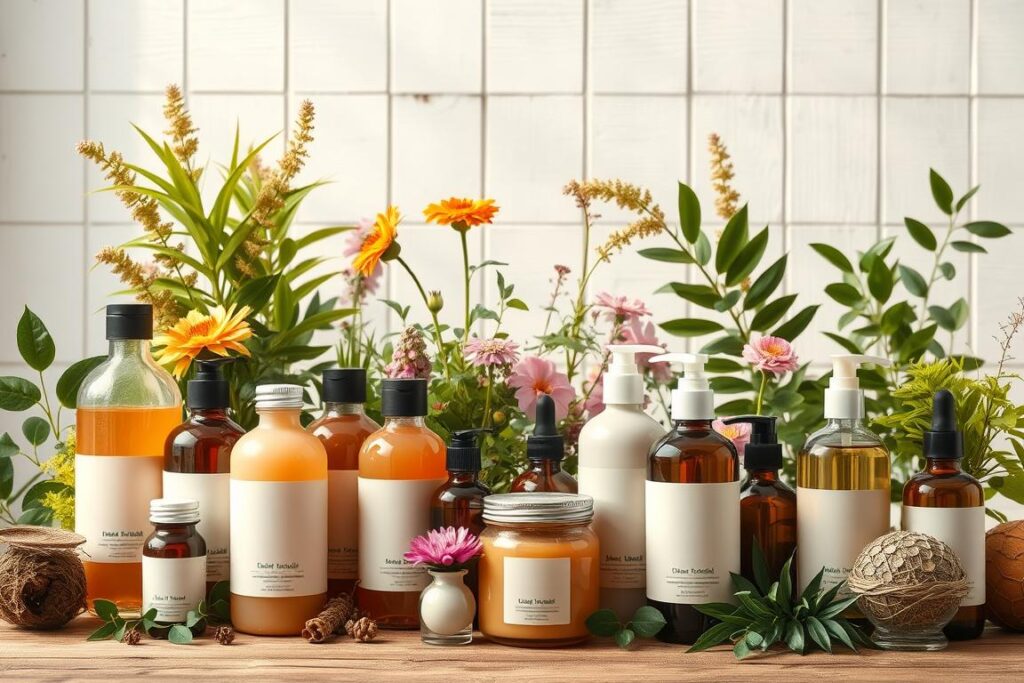
Influencers to Follow for Inspiration
Social media influencers are a great source of haircare tips. They share their experiences, favorite products, and advice. This can lead us to new effective haircare strategies.
When picking influencers, choose those who match our hair type and values. Their advice will be more relevant and helpful to us.
Local Brands Offer Natural Products
Supporting local brands for natural haircare is good for our hair and local businesses. These brands offer unique, natural products for different hair types. Exploring local options helps us find effective and natural solutions for our hair.
By staying informed and choosing sustainable and natural haircare, we get healthier, more radiant hair. We also support eco-friendly and local businesses.
Seeking Professional Guidance
Struggling to find the right haircare routine? Professional guidance can unlock healthier, more vibrant locks. Natural haircare tips and routines are great, but sometimes, expert advice is needed.
When to Consult a Haircare Expert
Know when your haircare isn’t working. If you face hair problems like dryness, dandruff, or loss, see a haircare expert.
Benefits of Professional Treatments
Professional treatments offer deep nourishment and repair. They improve scalp health too. These are custom-made for your hair concerns, better than generic products.
Finding the Right Salon for Natural Hair
Looking for a salon for natural hair? Find stylists who focus on natural haircare. Read reviews, ask for referrals, and check their product choices.
| Aspect | Professional Treatments | At-Home Haircare |
|---|---|---|
| Personalization | Tailored to individual hair needs | Generic, based on hair type |
| Expertise | Provided by experienced professionals | Relies on individual knowledge |
| Product Quality | High-quality, professional products used | Variable, depends on products chosen |
Conclusion: Our Journey to Healthy Hair
We’ve learned a lot about natural haircare. We now know how to get gorgeous, radiant hair with simple steps. Using DIY haircare remedies and organic products helps our hair grow healthier and is better for the planet.
Key Takeaways for a Haircare Routine
Understanding our hair type is key. We also learned to create a haircare routine that fits us. Using natural ingredients like coconut oil and aloe vera makes our hair healthier and more beautiful.
Empowering Our Haircare Journey
We’re excited to keep working towards healthy hair. We invite you to share your haircare tips and experiences. Together, we can support each other and stay updated on the latest in sustainable haircare.
